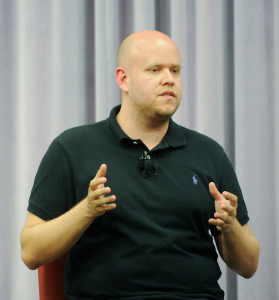“I never really thought of myself as an entrepreneur,” said Daniel Ek, cofounder and CEO of the music streaming service Spotify, to a packed NVIDIA Auditorium Wednesday afternoon. “I simply see a bunch of problems to solve and needs to satisfy, issues that no one else wanted to do anything about. Eventually, I decided to do it myself.”
Invited as part of the DFJ Entrepreneurial Thoughts Leader Seminar, Ek spoke on his entrepreneurial career as well as the future of the entertainment industry.

“An entrepreneur is someone who has an itch for a problem and is annoyed enough to solve it,” Ek said.
Since starting his first company designing and coding websites at age fourteen, Ek has moved on to found the advertising company Advertigo and has worked as chief technology officer of the online community Stardoll and chief executive officer of uTorrent, a BitTorrent client. He started his presentation, however, by explaining his rationale for founding Spotify.
“After the immense success of services like Napster and Kazaa around the millennium shift, it was clear to me that people wanted to consume music this way, on-demand and readily available,” Ek explained.
The fast Internet infrastructure in Sweden led Ek to found Spotify — together with Martin Lorentzon — there in 2004.
“Our goal was to create servers that were faster than the pirate servers,” he said. “We thought that if we managed to do this, we could get a big chunk of the 500 million people who consumed music illegally.”
Ek thought that the problem was not that people did not want to pay for music, but rather that an efficient and convenient platform for doing so was unavailable at the time.
“Because I was young and naive, I just thought ‘Hey, this can’t be too hard,’ but realized soon enough all the problems that arise from creating a service like Spotify,” Ek joked. “I did not even know that you needed licenses from the major [record labels]!”
Getting permission from record labels has actually been Spotify’s single largest problem to date. The negotiations with Universal took over a year, and Spotify has yet to acquire the rights from bands such as the Beatles or Led Zeppelin.
“We were convinced that our model would work, and that majors would make profits from letting us use their content,” Ek said. “But try for yourself to go and tell a 67-year-old man who barely agreed to sell the music on iTunes for 99 cents apiece to now give it away for free.”
The numbers have proved Ek right. While the average American spends $13 a year on music, the “premium” Spotify user pays $120.
“This allows us to compensate the right-holders the way they should be for the great job they are doing,” Ek said.
Responding to a question from the audience on whether Spotify would save the music industry, Ek said that the move away from physically purchasing music has created a need for innovation in the sector.
“Sweden, the first country where Spotify was implemented, is now one of the few countries that have a growing music industry,” he pointed out.
Ek also discussed the future of piracy, which he acknowledged as Spotify’s biggest competitor.
“Most people want convenience and easy access [to music],” Ek said. “With Spotify, people can feel that they have all the world’s music in their music library.”
However, he argued that — unless the television and movie industries work actively to solve the same problems the music industry is facing — illegal downloading will persist.
“I cannot accept that it takes a year for a great TV show like ‘Game of Thrones’ to be seen in Europe,” Ek said. “I want content to be readily available, and if I am willing to pay for it, why not?”
Ek concluded his talk by encouraging audience members to fix the issue, and pursue non-piracy solutions to the problem.